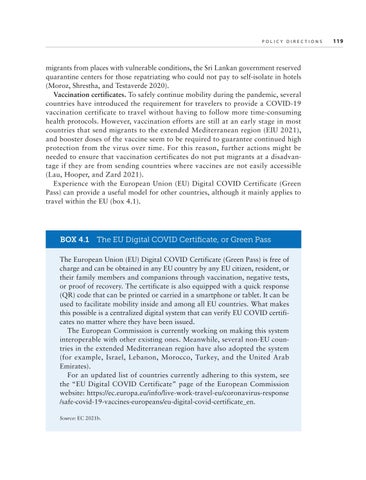P o l i cy D i r e c t i o n s
migrants from places with vulnerable conditions, the Sri Lankan government reserved quarantine centers for those repatriating who could not pay to self-isolate in hotels (Moroz, Shrestha, and Testaverde 2020). Vaccination certificates. To safely continue mobility during the pandemic, several countries have introduced the requirement for travelers to provide a COVID-19 vaccination certificate to travel without having to follow more time-consuming health protocols. However, vaccination efforts are still at an early stage in most countries that send migrants to the extended Mediterranean region (EIU 2021), and booster doses of the vaccine seem to be required to guarantee continued high protection from the virus over time. For this reason, further actions might be needed to ensure that vaccination certificates do not put migrants at a disadvantage if they are from sending countries where vaccines are not easily accessible (Lau, Hooper, and Zard 2021). Experience with the European Union (EU) Digital COVID Certificate (Green Pass) can provide a useful model for other countries, although it mainly applies to travel within the EU (box 4.1).
BOX 4.1 The EU Digital COVID Certificate, or Green Pass The European Union (EU) Digital COVID Certificate (Green Pass) is free of charge and can be obtained in any EU country by any EU citizen, resident, or their family members and companions through vaccination, negative tests, or proof of recovery. The certificate is also equipped with a quick response (QR) code that can be printed or carried in a smartphone or tablet. It can be used to facilitate mobility inside and among all EU countries. What makes this possible is a centralized digital system that can verify EU COVID certificates no matter where they have been issued. The European Commission is currently working on making this system interoperable with other existing ones. Meanwhile, several non-EU countries in the extended Mediterranean region have also adopted the system (for example, Israel, Lebanon, Morocco, Turkey, and the United Arab Emirates). For an updated list of countries currently adhering to this system, see the “EU Digital COVID Certificate” page of the European Commission website: https://ec.europa.eu/info/live-work-travel-eu/coronavirus-response /safe-covid-19-vaccines-europeans/eu-digital-covid-certificate_en. Source: EC 2021b.
119

